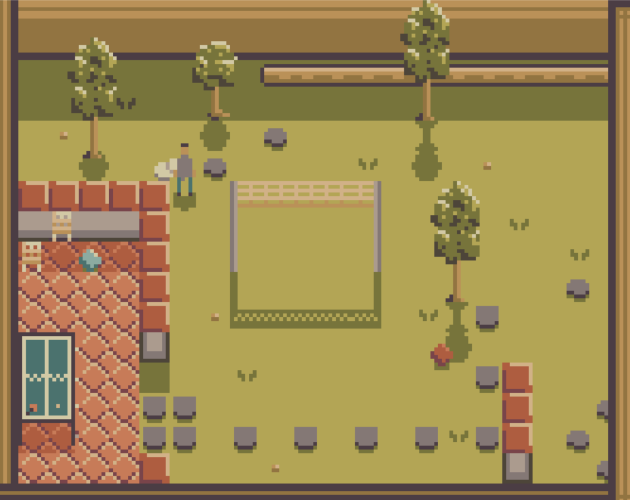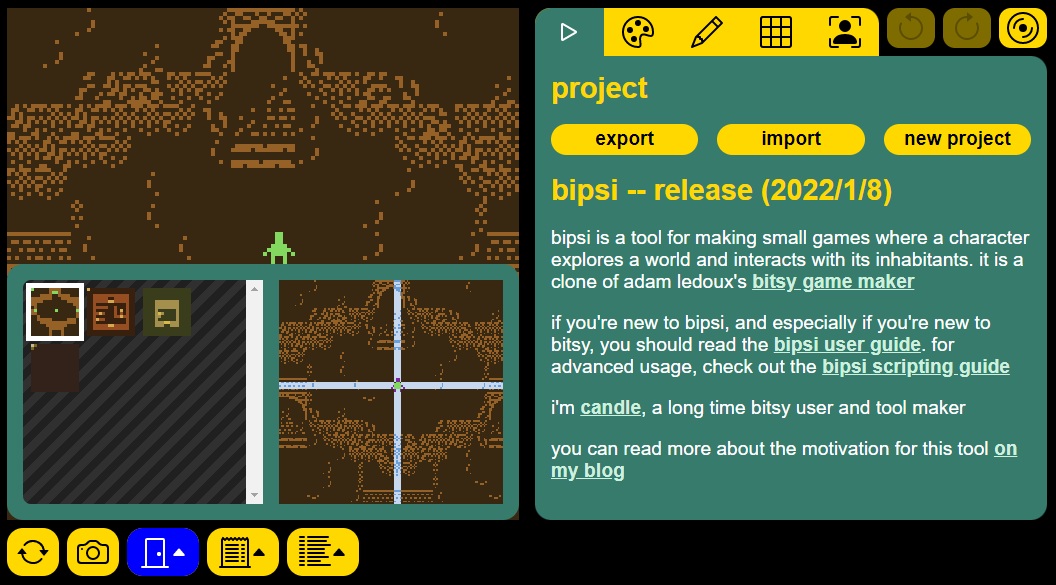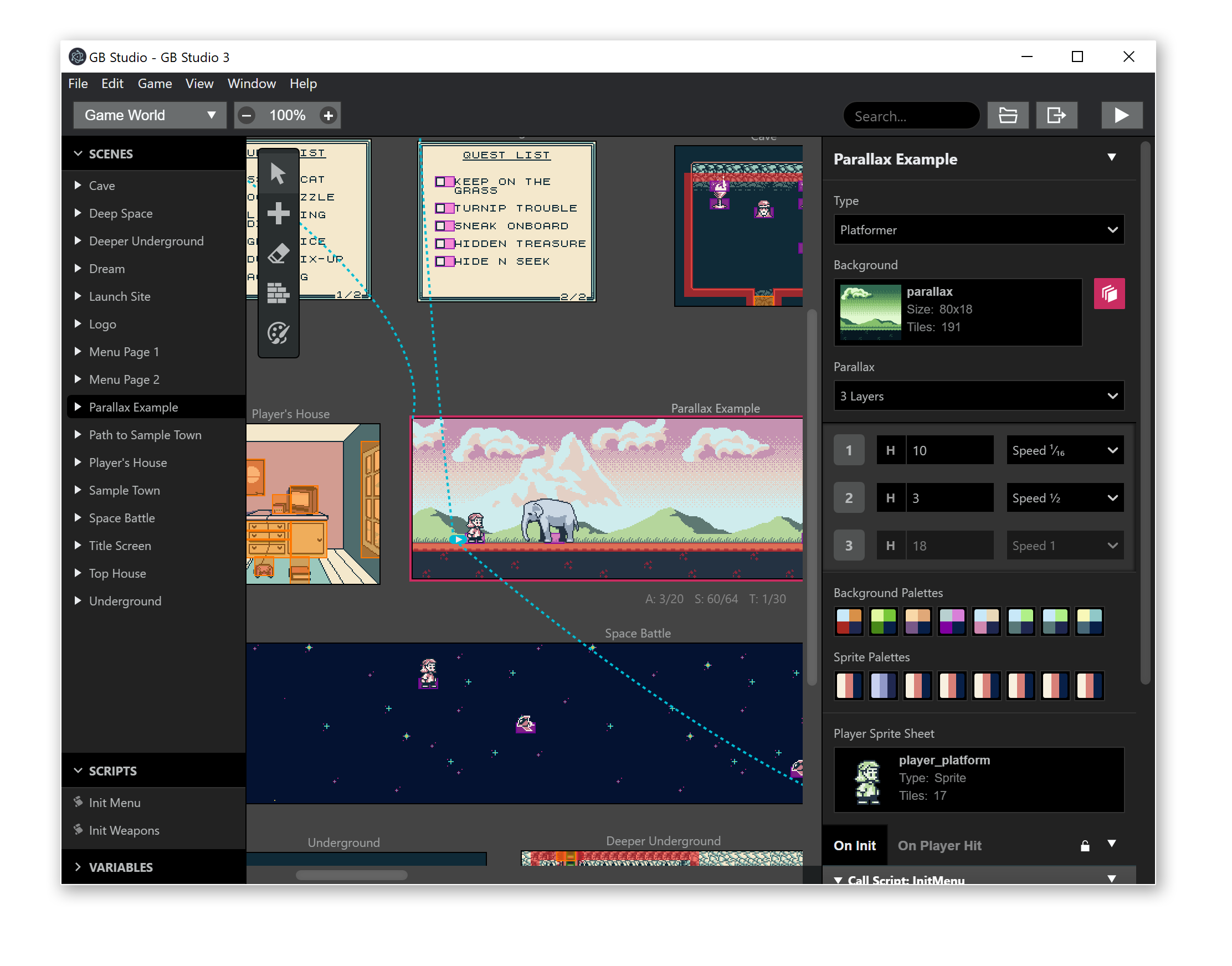Fringe Game Craft: An Exploration of Fantasy Consoles and Exotic Tools
This post is an ongoing exploration of fantasy consoles, exotic game engines/tools, and the surrounding communities. It is a journey of the space of game tools that embody the “unconventional mixed with practical” (Natalie Lawhead, 2019).
After years of working on commercial projects and using game methodology in other fields, I am conceptualising this endeavor as an artistic and playful respite, unburdened (as much as I possibly can) from external motivations such as commercial plausibility or critical reception. These playful tools usually live in the “space of cultural and economic activity that includes hobbyists, artists, gamemakers with day jobs, (…) modders, and students” (Brendan Keogh, 2023).
For a super comprehensive list, check out Everest Pipkin’s tool list: https://github.com/everestpipkin/tools-list. Otherwise, this piece is more about my personal experience as I navigate and use a small selection of them.
Arduboy

“Limitation breeds creativity” is a phrase so often expressed that it may feel like a cliché.
So yeah, the Arduboy handheld console only has two colours, a 128 x 64 pixel screen, 2.5 KBs of ram, and a tiny piezo speaker. But what can those limitations really mean?
It means accessible development tools. It means giving the console and the community a strong personality. It means brilliant little games and experiences that educate and inspire. It means having fun.
In the space of “Indie Consoles”, the Playdate tops the popularity charts , featuring its unique crank controller and super sleek design. But my heart was captivated by the Arduboy; it is a lot more accessible (read: cheaper), open source, and its limitations a tad sharper.

For it, I made Electrocardioground FX, a minimalist arcade game about keeping the beat alive, and a remake of a game I made for lowrez, a Gamejam with the requirement of having only 64x64 pixels on a screen.
Of note is also Arduboy’s community. It’s a very active online space with a regular stream of new games, tools, and weird lovely experiments being regularly shared. https://community.arduboy.com/
Play Electrocardioground FX here: https://community.arduboy.com/t/electrocardioground-fx/11952
Other Open source Handheld systems: https://community.arduboy.com/t/table-of-free-open-source-handheld-game-systems/9595 https://github.com/oshaboy/awesome-indie-handhelds

TIC-80
there are secrets in between these crunchy pixels echoes of childhood washed ashore with the waveforms let me wrap myself with this cozy world and create while I play, play while I create
The term “fantasy console” was coined by Pico-8’s creator zep. There is already much that has been said about working with fun and limited interfaces, and what that does to creativity. zep himself has a wonderful talk about it called “PICO-8 and the Search for Cozy Design Spaces” : https://www.youtube.com/watch?v=87jfTIWosBw
What may be less known, is how much this has inspired other projects and experiments. This list alone features almost 100! : https://github.com/paladin-t/fantasy
Having played with PICO-8 in the past, this time I wanted to venture further and try one of its direct offshoots, TIC-80.
It seems like a clone at first, but it’s open source, is a bit more customisable, and has native Android support. And what is creativity if not remixing and iteration?
With it, I made “Matchbox Memories”: I love carrying worlds and memories in my pocket.
You can play it here: https://oddgoo.itch.io/matchbox-memories-volume-i

Uxn

“If you wish to make an apple pie from scratch, you must first invent the universe”, said Carl Sagan. Hundred Rabbits’ Rek and Devine seem to be doing just that.
Uxn is a “personal computing stack” , a small virtual machine with its own programming language upon which they have built dozens of unique tools and games.
This project stood out to me due to the sheer level of DIYness across the whole thing. And then I saw the story behind it:
“We live and work aboard a ship called Pino. Sailing around the Pacific Ocean made us realize how fragile the modern computing stack was. Living in remote uninhabited parts of the world has offered us a playground to learn how technology degrades beyond the shores of the western world.”
That’s poetry!
Read more about them here!: https://100r.co/site/about_us.html
To imagine myself sailing with them, I installed the virtual machine and a few of the games and tools they have made.
 Oquonie, a game for the Uxn system.
Oquonie, a game for the Uxn system.

bipsi
.png)
An offshoot of Bitsy (https://bitsy.org/) “a little engine for little games, worlds, and stories”.
Bipsi is linked by Bitsy on the “Friends of Bitsy Page” https://bitsy.org/friends.html. And to me, this represents a lot of the beauty of these small tools and communities. There is remixing and collaboration instead of competition and litigation.
Can you imagine a world where Unity had a “Friends of Unity” page that linked to other engines and open source tools and extensions?
With bipsi, I’m making “Places from my dreams” for a small game jam:
https://oddgoo.itch.io/places-from-my-dreams
This exploration of bipsi was inspired by haraiva’s work: https://haraiva.itch.io/

Retroachievements
At the very core of achievement systems, there is still the very simple endorphin-inducing DING, the child-like gold star, the endorphin rush of putting a tick on a checkbox. And this has been abused commercially by most major platforms since the xbox 360 for the purposes of “customer retention”.
But then, there is Retroachievements. True to its name, it is an online platform that hooks on to emulators and adds achievement support to 50+ consoles, from the Fairchild Channel F to the Playstation Portable. It is a community built on open source tools, with grassroots organisation, a large amount of contributors, and a strict not-for-profit approach. It is the spirit of remixing, of taking an existing game, a piece of work, and making another game on top, a new interpretation.

I’ve been enjoying this site and system so much since discovering it, that I’ve now learned how to dig for memory addresses and develop my own achievement sets.
And even if at the surface it all still seems superficial, the amount of participation and user content has now added a layer of game archival and historic preservation layer to it, in the forms of guides, discussions, and the surfacing of obscure systems and titles.

GBStudio
It tickles, the ability to produce a ROM for a system that represented the ultimate gaming machine in the days of childhood.
I have not yet made a game with it, but I’ve explored the ecosystem and played many of its titles.
GB Studio stands out as making Gameboy (and GB Color) development not only accessible, but easy and fun. Focusing on a few genres, and allowing itself to be opened up for further modding, anyone can have a true game-boy compatible game.
Similar to other tools showcased here, the limitations of the system are cozy and creative fuels; but the ability to take your game, flash it on a cart, and play it on the same system that you may have had for 30 years adds another layer of magic.

More links and inspiration
Natalie Lawhead’s Blog:
Itch.io’s tool catalogue:
